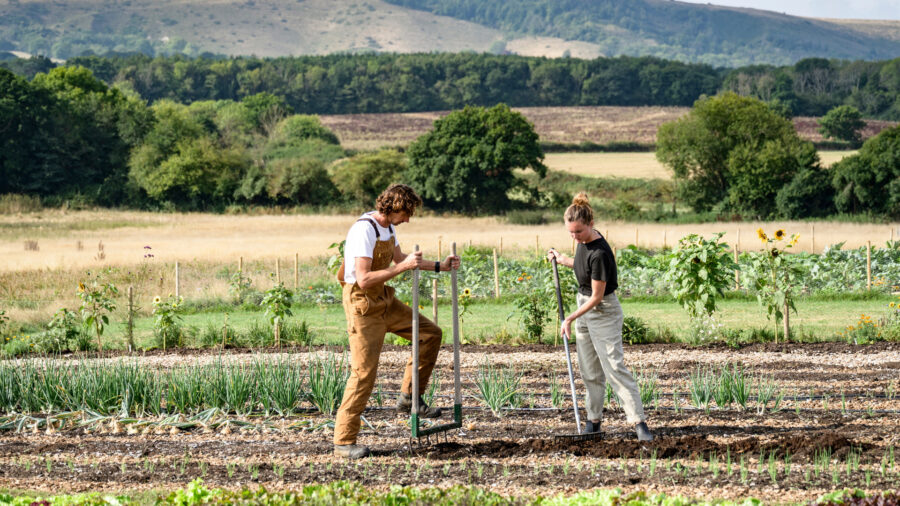Editor’s note: Jim Slama is the managing director of Naturally Chicago.
“Common Ground,” a new documentary about regenerative agriculture, is selling out showings across the country with this primary theme: growing food using regenerative methods is a powerful solution for climate change.
The world is suffering yet another drastic weather year, with massive heat waves, droughts, floods and wildfires. It can feel as though there’s little prospect of solving climate change. But with the messaging carried by several Hollywood stars, “Common Ground” radiates hope through a simple answer: Let’s grow nutrient-dense food in a manner that sequesters vast amounts of carbon in our soil.
Rodale Institute is a non-profit agriculture research organization that has been promoting organic farming for more than 75 years, and in 2018 created the Regenerative Organic Certified label that now appears on a growing number of food items in grocery stores.
According to Rodale, if we converted all global croplands and pastures to regenerative and organic practices, we could sequester more than 100% of current annual CO₂ emissions.
Farmers using these practices grow organically, using crop rotations, cover crops and, in many cases, rotational grazing of livestock and/or poultry. The result is incredibly healthy, carbon-rich soil, and food loaded with nutrients, minerals and vitality.
High Profit Potential
According to SPINS, sales of regenerative products have been growing by more than 20% for the past year. They align perfectly with the desires of values-oriented consumers who are increasingly seeking products that are better for themselves and the planet.
Simple Mills is a leader in producing packaged goods with regeneratively grown ingredients. The brand has become the market leader in nutrient-dense crackers, baking mixes and cookies that are gluten free and often organic. Katlin Smith, their founder/CEO, has built a stellar team of experts who embed sustainability into all aspects of product design.
“We design all our new products with an eye toward diversifying consumer diets and agricultural ecosystems by utilizing a wide variety of ingredients beyond the most dominant crops in our food system,” said Christina Skonberg, Simple Mills’ head of sustainability and mission.
The brand works directly with farmers who prioritize regenerative principles and incentivize positive ecosystem outcomes. Priority crops include almonds, cocoa, coconut sugar, sunflower, and even squash, buckwheat and flax.
Meanwhile, the Chomps company utilizes regeneratively raised beef in its meat snack products.
“All of our beef is sourced from cattle that are certified humane, grass-fed and grass finished, and follow rotational grazing methods,” says Rashid Ali, co-CEO. “Because of our rapid growth, we are adding additional farms that are Regenerative Organic Certified and/or Land to Market Certified. These are considered to be the gold standards of third-party certification for ranchers.”
Innovative Ag Practices
Vital Proteins became the market leader in the collagen category in part by stressing that their cows are grass-fed and raised on pasture.
Rotational grazing on pastures is an essential tool to restore degraded grasslands. According to the USDA, this practice improves soil structure and limits erosion, makes land drought resistant, reduces costs and increases profit, produces healthier animals, and sequesters large amounts of carbon in the soil.
James Beard Award Winning Chef Rick Bayless, a fan of regenerative farming, is a long-term customer of Indiana rancher Greg Gunthorp, who produces pastured pork, lamb and turkeys. Gunthorp recently contracted with BP to pasture his sheep on a 900-acre solar site. The sheep will be rotated daily to control vegetation without a lawnmower in sight. It’s truly a regenerative win-win, with some of the best tasting meat around.
Small to medium-sized farms have taken the lead in adopting regenerative practices, but Big Food companies are embracing regenerative at scale.
General Mills has a goal to advance regenerative agriculture on 1 million acres of land by 2030. Cargill is “committed to support farmer-led regenerative agriculture practices and systems across 10 million acres of agricultural land in North America by 2030.”
Regenerative agriculture is also driving the increased production of grain — including highly nutritious artisanal and heirloom varieties — that is grown organically.
Harold Wilken, owner of Janie’s Farm and Janie’s Mill, was ahead of his time in 2005 when he started growing and milling organic grain. Today his products are used in leading bakeries and food processors, and he has played a pioneering role in persuading a growing number of farmers to follow his model.
Elsewhere, Barilla’s legume pasta line utilizes lentils and chickpeas, ideal rotational crops that add diversity and natural nitrogen to the soil. Rana Meal Solutions sources vast amounts of organic wheat for its line of fresh pastas in its club, retail and foodservice channels.
Chicago-based Yishi uses organic and sustainably grown oats for its innovative line of oat cereals and spreads. Quaker and parent company Pepsico are moving towards regenerative oat production in partnership with Walmart and ADM, creating a major global initiative to encourage farmers to adopt regenerative practices.
According to Bill Weiland, CEO of Presence Marketing and a leading prognosticator of food trends: “Oats are a leading regenerative grain. They are an excellent cover crop that also are a great cash crop for farmers in a rotation. Companies like Oatly have grown quickly and are now focusing on moving their supply chain to source regeneratively grown oats. This will have a dramatic impact on nutrient density while sequestering vast amounts of carbon in the soil.”
Film’s Impactful Message
The film “Common Ground” is a master class on how regeneratively grown food uses ancient techniques to build soil. With narration by Hollywood stars including Laura Dern, Rosario Dawson and Woody Harrelson, filmmakers Josh and Rebecca Tickell demonstrate ways farmers can build healthy soil, sequester vast amounts of carbon while making more money.
Farmer Rick Clark is featured in “Common Ground,” which describes how he transitioned his 7,000-acre farm to regenerative organic. He’s the fifth generation of Clarks to farm the land, which is 100 miles south of Chicago.
Clark transitioned to organic production after experiencing massive amounts of erosion on his land two decades ago. He now grows a diverse array of corn, soybeans, rye, wheat, oats, sorghum and peas, while also rotationally grazing cattle and sheep.
“While my yields are lower, I’m producing much healthier food without exposing my family to the toxic chemicals in conventional agriculture,” he said. “We are also sequestering vast amounts of carbon in the soil and have an incredible amount of resilience in the event of drought or massive storms.” Clark said he no longer needs federal crop subsidies or crop insurance, either.
“Common Ground” is playing across much of the U.S. Check here to see its schedule and learn more.












